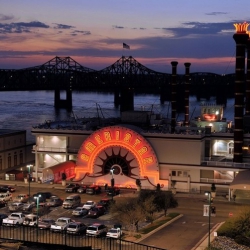Pennsylvania casino and racetrack operator Penn National Gaming Inc. bought Pinnacle Entertainment Inc. in a $2.8 billion deal. The deal includes a third operator, Boyd Gaming of Nevada, which plans to buy four Pinnacle properties for a total of $575 million. Boyd Gaming’s new casinos are located in Missouri, Indiana, Pennsylvania, and Ohio.
At the deal’s close, Penn National will operate 41 casinos in 20 different jurisdictions. That total will be almost double the 24 that Caesars Entertainment Corp. owns, once it completes its recently announced Indiana purchase. The current deal is the largest transfer of US casinos since 2013.
Penn National can expect an annual revenue of about $5 billion, once the deal is done. Penn National will own a combined 53,500 slots, 1,300 tables, and 8,300 hotel rooms in the United States alone, while employing 53,000 workers. The addition of Pinnacle will bring in around $100 million annually with the help from the elimination of some redundant corporate expenses as well as improved property efficiencies.
Though the company’s executives have complained recently they are competing against giants, the deal makes Penn National the third-largest casino operator of domestic US casinos, behind only MGM Resorts International and Caesars Entertainment Corp. Las Vegas Sands Corp. and Wynn Resorts Ltd. have more lucrative international casino operations and bring in a larger total revenue.
Terms of the Pinnacle Entertainment Buyout
Pinnacle Gaming shareholders will receive $20 in cash — along with 0.42 shares of Penn National — for each share that they own. The total purchase price of $32.47 for each share. Penn National expects the deal to be completed by the second half of 2018.
According to analysts, the expansion of Penn National’s regional client base will allow the company to increase occupancy at Tropicana and M Resort, by marketing to their Las Vegas properties. SunTrust analysts C. Patrick Scholes and Bradford Dalinka, “Combining databases and utilizing Penn’s Vegas footprint could provide revenue upside.”
Moody’s Analysis of Penn-Pinnacle Buyout
Moody’s Senior Vice President Keith Foley said, “The combination of Penn and Pinnacle, two large regional gaming companies in their own right, creates a regional gaming behemoth with a tremendous amount of geographic diversity, cross-selling opportunities, and potential operating synergies that will favorably impact margins.”
The Penn National-Pinnacle-Boyd Gaming deal represents continued consolidation in the domestic US casino market. Since 2015, 19 major mergers or acquisitions have happened in the U.S. gambling sector. Union Gaming, a Las Vegas brokerage, said nearly $10 billion in U.S. casino purchases have happened since 2015
John Decree of Union Gaming said, “Casinos are not like a Walgreens, that you can open on any corner. There is a finite supply [of licenses]”.
Decree expects gaming consolidation will continue through to 2018, since interest rates should remain low. The Union Gaming analyst said that Penn National, Eldorado, Caesars Entertainment, Boyd Gaming, and Golden Entertainment all are potential holders of regional assets.
In November, both Caesars and Boyd announced new acquisitions. Caesars said it was obtaining two Indiana-based casinos for a total of $1.7 billion, while hinting at more possible deals in the near future. Boyd Gaming Chief Executive Officer, Keith Smith, said that the Off-the-Strip Las Vegas casino operator would like to add to its Nevada holdings.
Boyd Gaming’s Casino Properties
Pinnacle had plans to sale 4 of its casinos to Boyd Gaming, prior to its purchase by Penn National. Ameristar Kansas City, Ameristar St. Charles in Missouri, Belterra Casino Resort in Indiana and Belterra Park in Ohio. JPMorgan Chase said in a Monday report on the deal, “These [four] assets are in great shape. [They] increase Boyd’s geographic diversity and add the benefit of scale.”
Boyd Gaming’s presence in Nevada overall may be larger, but Boyd has not been relevant on the Strip since the company sold the Echelon project, located where the Stardust once stood, in 2013. Boyd Gaming sold the development to a Malaysia-based company, Genting Group, for $350 million. Genting purchased the land for its upcoming Resorts World Las Vegas, which will be the largest and most expensive casino ($4.1 billion) ever built in Las Vegas.
Keith Smith has talked about wanting to get back on the Strip since the 2013 Echelon sale. In a Monday conference call with analysts, the Boyd Gaming CEO said, “The Las Vegas Strip is still on our list of places to be. We love Las Vegas and Las Vegas has a lot of growth left in it. We’ll get there eventually.”
Following the purchase, Boyd will now own and operate 28 properties located in nine different states. Those properties will contain a total of 38,000 slots, 900 table games as well as 11,000 hotel rooms.
Penn National Gaming Profile
Penn National Gaming is a Pennsylvania-based racetrack and casino company which bought out a rival for $2.8 billion this week. Penn National owns racetrack-casinos in Pennsylvania [Hollywood Casino] and Massachusetts [Plainridge Racetrack], as well as gaming venues in a number of other states, including a couple in Tunica, Mississippi.
Pinnacle Entertainment Profile
Pinnacle Entertainment owns several St. Louis casinos, including Ameristar casinos. The company sold the famous St. Louis casino, Lumiere, to Carl Icahn.
Before the buyout, Pinnacle Entertainment owned casinos in Colorado, Indiana, Iowa, Louisiana, Mississippi, Missouri, Nevada, Pennsylvania, and Ohio. Pinnacle also owns a horse track in Texas.

